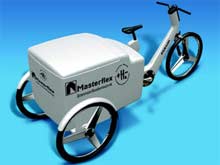Deutsche Telekom is testing 14 fuel-cell powered Cargobikes in Berlin according to reports. This is the first commercial testing of bikes assisted by hydrogen powered fuel cell motors that could lead to large scale commercial use.
Clean Air Bike is the result of a joint-venture between Masterflex and German bike maker Hawk. It is claimed the Cargobike can handle loads up to 550 pound and one fuel cell lasts for 155 Miles powered by only 90grams of hydrogen within a 2.2kg storage unit.
With a motor rated at 250 watts it's exempt, just like a ‘normal' bike, from European vehicle registration laws (in other words no MOT, insurance or tax requirements).
Masterflex say that not only does the fuel cell technology provide sufficient power for the motor but that there is enough surplus for secondary functions such as lighting or cooling for transporting temperature sensitive goods. Potential uses include postal delivery services, city cleaning divisions, large industrial site transport and tourist applications.
Hydrogen fuel-cell assisted bikes are also in the UK. Alternative energy company Valeswood ETD Ltd launched the Pearl Hydrogen Cycle in September 2007 and have sold this 'concept bike' costing $3800 to customers who need to demonstrate what hydrogen power can do. These include the Environment Agency and the University of Sunderland.
Valeswood's Managing Director John Turner described the advantages of hydrogen fuel cell electric bikes over battery powered ones. "Pound for pound, hydrogen-powered fuel cells deliver three times the energy of conventional batteries and unlike petrol motors the only emission is water," he said.
He also pointed out some of the downsides: "There is no national supply network where hydrogen is available on tap to end users and so Pearl Hydrogen Cycle owners will have to have access to their own hydrogen gas container to use for refuelling."
Turner stressed that hydrogen was thought of as a dangerous fuel but that at the relatively low pressures it was used at on the Pearl he believed it was as safe or even safer than conventional lithium-ion battery technology that is in widespread consumer use.
Hydrogen powered fuel-cells have often been talked up as one of the solutions to the problem of global warming caused by transport CO2 emissions from fossil fuels. The technology uses compressed hydrogen gas to produce emissionless power at the point of use. But debate has centred around how best to extract and store hydrogen from the natural world. One of the greenest methods, but one that is still being developed, is to extract the hydrogen directly from sunlight without using any fossil fuels in the process, potentially delivering a totally green transport fuel.

